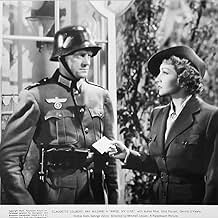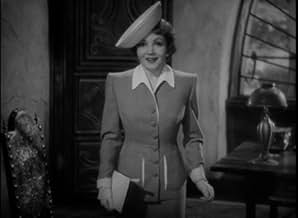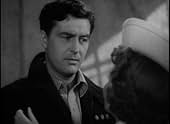AVALIAÇÃO DA IMDb
6,8/10
1,1 mil
SUA AVALIAÇÃO
Adicionar um enredo no seu idiomaA dashing pilot and a vivacious reporter have romantic and dramatic adventures in Europe as World War II begins.A dashing pilot and a vivacious reporter have romantic and dramatic adventures in Europe as World War II begins.A dashing pilot and a vivacious reporter have romantic and dramatic adventures in Europe as World War II begins.
- Direção
- Roteiristas
- Artistas
- Ganhou 1 Oscar
- 4 vitórias e 3 indicações no total
Rafael Alcayde
- French Correspondent
- (não creditado)
Rudolph Anders
- Prussian Officer
- (não creditado)
Carmen Bailey
- Woman at Maxim's
- (não creditado)
Charles Bastin
- Elevator Boy
- (não creditado)
Avaliações em destaque
An unusually constructed film which starts off like a screwball comedy albeit to the backdrop of both the recently-ended Spanish Civil War and newly-begun Second World War and finishes up as an interventionist call-to-arms against the global threat of Nazism.
I think it works, aided naturally by the writing of the justly celebrated screenwriting partnership of Wilder and Brackett, capable direction of Mitchell Leisen and especially the on-screen chemistry of the emerging Ray Milland and the established Claudette Colbert. You can almost picture the censor of the day's pencil hovering over some of the early scenes in the movie as they coyly play cat-and-mouse with one another, in particular one risqué exchange between the two stars with a double bed prominently featured in the background.
Walter Abel as Colbert's end-of-his-tether editor is rather clichéd but largely speaking, the parts of the lesser characters, such as Milland's two pilot chums and the hotel maid with family caught up in the confusion which add some shade and light to the main characters' motivations are well selected and portrayed.
I particularly appreciated the topicality of the depiction of very recent real-life events such as the sinking by German submarines of the cruise-liner Athenian taking Milland and Colbert back to the States and the montage of succeeding newspaper headlines documenting the at-the-time seemingly unstoppable march of the German Army.
Colbert later named this as her favourite of all her movies and I doubt that's just because the film ended up on the right side of history. It manages that tricky balancing act between comedy and drama in a contemporary setting and still finds room for an eloquent wake-up call to the rest of the world at its time of greatest need.
I think it works, aided naturally by the writing of the justly celebrated screenwriting partnership of Wilder and Brackett, capable direction of Mitchell Leisen and especially the on-screen chemistry of the emerging Ray Milland and the established Claudette Colbert. You can almost picture the censor of the day's pencil hovering over some of the early scenes in the movie as they coyly play cat-and-mouse with one another, in particular one risqué exchange between the two stars with a double bed prominently featured in the background.
Walter Abel as Colbert's end-of-his-tether editor is rather clichéd but largely speaking, the parts of the lesser characters, such as Milland's two pilot chums and the hotel maid with family caught up in the confusion which add some shade and light to the main characters' motivations are well selected and portrayed.
I particularly appreciated the topicality of the depiction of very recent real-life events such as the sinking by German submarines of the cruise-liner Athenian taking Milland and Colbert back to the States and the montage of succeeding newspaper headlines documenting the at-the-time seemingly unstoppable march of the German Army.
Colbert later named this as her favourite of all her movies and I doubt that's just because the film ended up on the right side of history. It manages that tricky balancing act between comedy and drama in a contemporary setting and still finds room for an eloquent wake-up call to the rest of the world at its time of greatest need.
Mitchell Leisen was one of the few directors who could introduce tragedy into comedy and vice versa .The first part is absolutely dazzling.Incredible though it may seem ,it's full of unexpected twists,of fine lines ("it's my first execution" says the Padre /It's mine too" says the prisoner).The chemistry between Claudette Colbert and Ray Milland is perfect and their husband-and-wife act compares favorably with that of the actress as a "baroness ,her husband and her children" in "midnight" .The movie loses steam in its second part but it does show Mitchell's fondness for France .Unlike too many American movies,there are plenty of French words and the French speak French between them.I particularly like this sentence "Three sisters used to live in this country :Liberté ,Egalité Et Fraternité " as the German army is marching past the streets of Paris.This francophilia is also present in Leisen's "hold back the dawn" or "Frenchman's creek" .
The last third may be considered a propaganda one ,but many other directors (Hitchcock,Lang,Hathaway,Borzage etc) had theirs too,and Leisen's is certainly smarter than most of the others.Solomon's prayer (which provides the title) is to be taken literally.Augusta is a go-getter ,she plays the heroine just for the sake of fame .After the beautiful scene in the forest ,where the animals run for their lives ,she does arise .The scene in the Compiègne Car is as incredible as Marlene Dietrich as a gypsy entering an inn full of Nazis in "golden earrings" .But the Spanish extravagant tale had warned us:this is not to be taken seriously ,but in a way,it is.
The last third may be considered a propaganda one ,but many other directors (Hitchcock,Lang,Hathaway,Borzage etc) had theirs too,and Leisen's is certainly smarter than most of the others.Solomon's prayer (which provides the title) is to be taken literally.Augusta is a go-getter ,she plays the heroine just for the sake of fame .After the beautiful scene in the forest ,where the animals run for their lives ,she does arise .The scene in the Compiègne Car is as incredible as Marlene Dietrich as a gypsy entering an inn full of Nazis in "golden earrings" .But the Spanish extravagant tale had warned us:this is not to be taken seriously ,but in a way,it is.
I am so mad at myself because I watched this in the 80's and 90's on American Movie Classics and like an idiot I didn't record it. Now I haven't seen it on any channel in years and it isn't available on VHS or DVD.
This is just such a breath of fresh air for a 1940 movie. It's a movie where the woman is as smart as the man and is allowed to show it and in the end stands tall with him instead of behind him. The dialogue is funny, which given the exceptional writers like Billy Wilder, is not surprising. Colbert and Milland have wonderful chemistry. It's a movie I adore from start to finish. Now if only Paramount would get off their arses and release this movie on DVD, I'd be thrilled.
This is just such a breath of fresh air for a 1940 movie. It's a movie where the woman is as smart as the man and is allowed to show it and in the end stands tall with him instead of behind him. The dialogue is funny, which given the exceptional writers like Billy Wilder, is not surprising. Colbert and Milland have wonderful chemistry. It's a movie I adore from start to finish. Now if only Paramount would get off their arses and release this movie on DVD, I'd be thrilled.
Mitchell Leisen gets superb performances from CLAUDETTE COLBERT and RAY MILLAND in ARISE, MY LOVE.
It's a comedy/drama with Claudette as a journalist tired of covering fluffy stories who decides to get into serious journalism by rescuing a man about to be executed during the Spanish Civil War (Milland) so that she can be the first writer to get a scoop on a great story. As soon as she and her prisoner meet, the deft comic timing of these two pros are given great support from Billy Wilder's clever script. Early on, there's a scene of mistaken intentions that has Ray thinking Claudette wants to seduce him. He's oblivious to the fact that she merely wants to take some photos of him for the article she intends to write. The double entendre dialog has seldom been matched, in this scene alone.
Personally, I prefer "Midnight," another Leisen/Colbert film shown before this one on TCM. It's even wittier and much funnier. The trouble with ARISE, MY LOVE is that it attempts to do too many things at once and emerges as an uneven romantic comedy with a war background. For the ending, Claudette gets to deliver a flag waving speech that is obviously meant for 1940 audiences who were facing the prospect of getting involved in WWII.
Lots of laughs along the way with both stars delivering excellent performances.
It's a comedy/drama with Claudette as a journalist tired of covering fluffy stories who decides to get into serious journalism by rescuing a man about to be executed during the Spanish Civil War (Milland) so that she can be the first writer to get a scoop on a great story. As soon as she and her prisoner meet, the deft comic timing of these two pros are given great support from Billy Wilder's clever script. Early on, there's a scene of mistaken intentions that has Ray thinking Claudette wants to seduce him. He's oblivious to the fact that she merely wants to take some photos of him for the article she intends to write. The double entendre dialog has seldom been matched, in this scene alone.
Personally, I prefer "Midnight," another Leisen/Colbert film shown before this one on TCM. It's even wittier and much funnier. The trouble with ARISE, MY LOVE is that it attempts to do too many things at once and emerges as an uneven romantic comedy with a war background. For the ending, Claudette gets to deliver a flag waving speech that is obviously meant for 1940 audiences who were facing the prospect of getting involved in WWII.
Lots of laughs along the way with both stars delivering excellent performances.
10clanciai
Both Claudette Colbert and Ray Milland are superb in this brilliant war comedy drama in the shadow of the Spanish civil war and the Second World War. It was Claudette Colbert's own favourite among her films, and you'll understand some of its qualities better when you study the list of the script writers, one of whom was the young Billy Wilder. The dialog is brilliant all the way, there is any amount of eloquent scenes, and the romance gradually grows quite naturally with some skirmishes along the way. Walter Abel also gives one of his best performances as Claudette Colbert's employer, as he also gets his nose too far out into the business. Claudette Colbert is a journalist who goes to Spain to get out an American prisoner, who awaits his execution. That is Ray Milland, and the very first scene is perhaps the very best one, as Ray Milland sits in his cell waiting for his execution playing cards with a priest, while the firing squad is busy just outside, leaving one body just outside Ray Milland's window in a shadow that won't go away. Add to this the romantic music of Victor Young, which adorns many of the long romance scenes, while gradually the comedy transcends into a major war drama, with some curious coincidences on the way: on the train to Berlin, both Ray and Claudette being together on it, the emergency break is pulled just as the war breaks out, and when Ray and Claudette decide to leave all career thinking behind and go back to America to embark on a normal life, their ship gets torpedoed, and the war starts for real.
It's a delightful and innovative comedy all the way, eloquently mixed with some very serious business, and the film is so positive and edifying, that it would be worth returning to it every once in a while - it's the perfect emergency readiness film.
It's a delightful and innovative comedy all the way, eloquently mixed with some very serious business, and the film is so positive and edifying, that it would be worth returning to it every once in a while - it's the perfect emergency readiness film.
Você sabia?
- CuriosidadesClaudette Colbert once said that this was the favorite of all of her films.
- Erros de gravaçãoWhen Walter Abel tells Claudette Colbert that she has got a new assignment in Berlin and she is told she is going in 3 days time on Saturday, she receives a cable dated September 1st, 1939, from Ray Milland. September 1st, 1939, was a Friday.
- Citações
Mr. Phillips: Gusto Nash, you're fired, as of immediately!
Augusta Nash: Oh, it's not true!
Mr. Phillips: I know it's not true. I just wanted to taste the words. Sheer rapture!
- ConexõesFeatured in Hollywood contra Franco (2008)
- Trilhas sonorasDream Lover
(1929) (uncredited)
Written by Victor Schertzinger
Lyrics by Clifford Grey
Sung and hummed by Claudette Colbert
Introduced in Alvorada do Amor (1929)
Principais escolhas
Faça login para avaliar e ver a lista de recomendações personalizadas
- How long is Arise, My Love?Fornecido pela Alexa
Detalhes
- Data de lançamento
- País de origem
- Idiomas
- Também conhecido como
- Arise, My Love
- Locações de filme
- Empresa de produção
- Consulte mais créditos da empresa na IMDbPro
- Tempo de duração
- 1 h 50 min(110 min)
- Cor
- Proporção
- 1.37 : 1
Contribua para esta página
Sugerir uma alteração ou adicionar conteúdo ausente


































